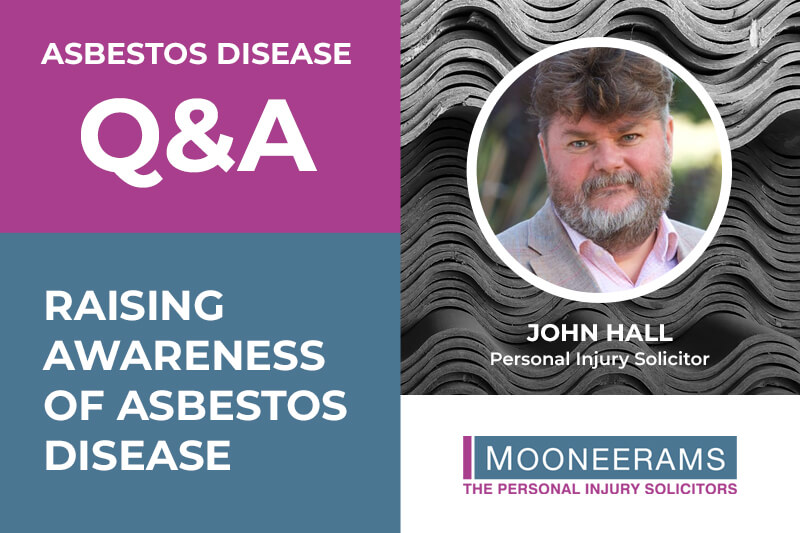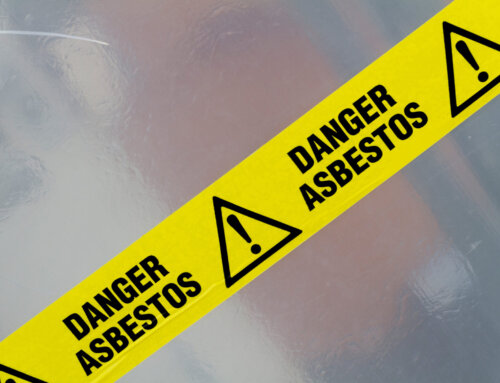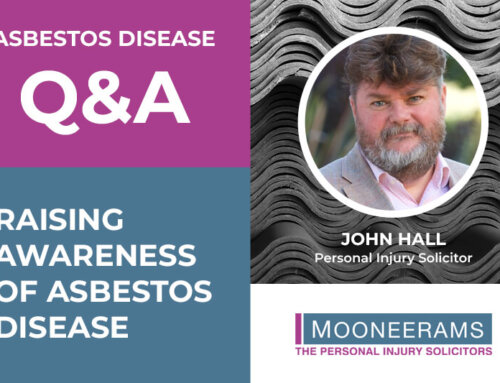In the first of our seven-part series of blogs taken from a live Q&A session, asbestos disease expert John Hall talked about the asbestos conditions of Pleural Plaques and Pleural Thickening. In this second blog, John talks about the condition of Asbestosis.
John, you’ve already told us all about Pleural Plaques and Pleural Thickening, what’s the next asbestos disease you want to talk to us about?
We turn now to the asbestos disease that everyone assumes is the only asbestos condition in existence and that is asbestosis. Unhelpfully some doctors and others involved in dealing with asbestos victims, will refer to all asbestos diseases as asbestosis. So, just because someone tells you you’ve got asbestosis, don’t simply assume that that is the disease you’ve got! A lung disease specialist is the best person to confirm your diagnosis as being a specific type of asbestos disease.
What is asbestosis?
Asbestosis is a form of pulmonary fibrosis. It has particular features that you would see on a chest x-ray or CT scan. Asbestosis tends to be slow to develop and so if you have a patient who is getting symptoms very rapidly, asbestosis sometimes gets discounted because it doesn’t fit the picture of what the disease should look like.
Asbestosis is caused by fairly heavy doses of asbestos exposure gained over a fairly long period of about two years, in total, for the condition to be diagnosed as asbestosis. It doesn’t have to be the case that you worked at a firm for two years and were exposed to asbestos on every day of that two-year period.
You may have worked for a company for twenty years, during which you worked intermittently with asbestos for spells, together add up to working with asbestos for eight hours a day over a two-year period. This is one of the methods used to establish whether the amount of exposure to asbestos in any case, is of a high enough dose to have caused asbestosis. In addition, a medical expert’s opinion will be required to confirm the diagnosis.
It does not require a particularly heavy dose of asbestos to cause pleural thickening. However, the presence of pleural thickening or even pleural plaques can help medical experts to confirm a prognosis of asbestosis. The very presence of pleural thickening or pleural plaques confirms that the person in question has been exposed to fairly large amounts of asbestos.
Am I likely to die if I get asbestosis?
I tell my clients that as a general rule, asbestosis is a disease you will die with not from. It can be debilitating, and it can cause quite a lot of respiratory disability, but it generally won’t kill you. Some people do die from asbestosis. Sadly, some asbestosis sufferers simply find themselves unable to cope with their illness any longer, particularly where they’ve got other health problems as well.
Whilst asbestosis is portrayed as a killer, and of course sometimes it can be, the irony is that there are other forms of pulmonary fibrosis that are quite appallingly debilitating. So, whilst it sounds strange to say this, it’s not always the worst news to be diagnosed with asbestosis. Although, I do get clients recently diagnosed with asbestosis who assume the worst and that they will die from the illness, it’s by no means always the case that they will.
Doctors are pretty good these days at giving reassurance to asbestosis patients. The key with all these illnesses is to listen to what your doctors say. They will be straight with you and won’t leave you in the dark.
If you get asbestosis your disability could eventually be as high as one hundred percent but more typically it will be around the thirty to forty percent mark. At thirty percent disability you may have difficulty walking more than one hundred yards unaided, find walking upstairs difficult to do, and generally ‘get out of puff’ quite easily. However, in most cases, at thirty percent disability you would stop short of needing a wheelchair.
In the third of our series of blogs, ‘Asbestos disease Q&A’, John Hall will talk about Asbestos Lung Cancer.
If you are thinking of making a claim for asbestos disease compensation from your former employer, even if it was many years ago, and would like to speak to John Hall, on a free, no-obligation basis, call Mooneerams on 029 2199 1927 or email us at enquiries@mooneerams.com and we’ll get John to call you back.




